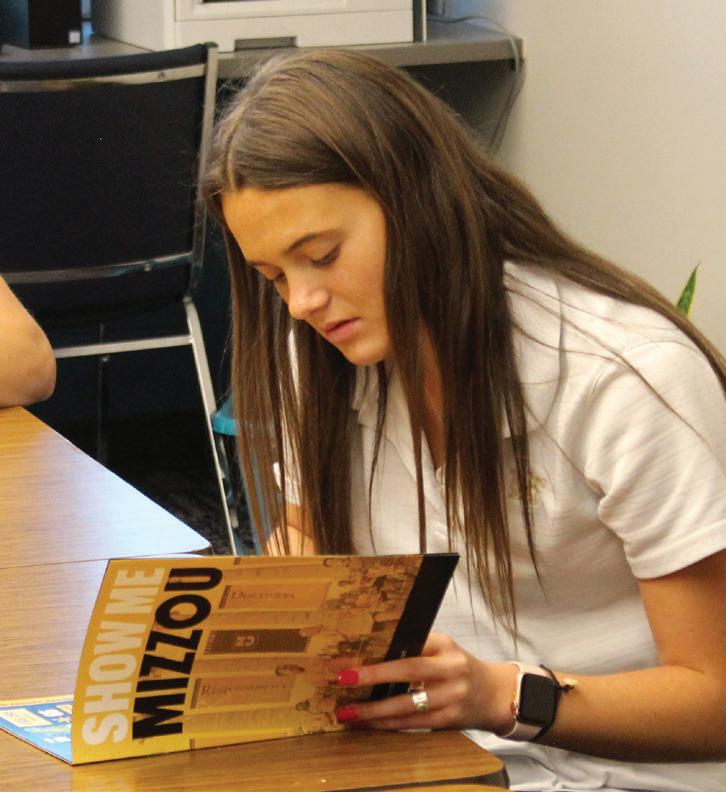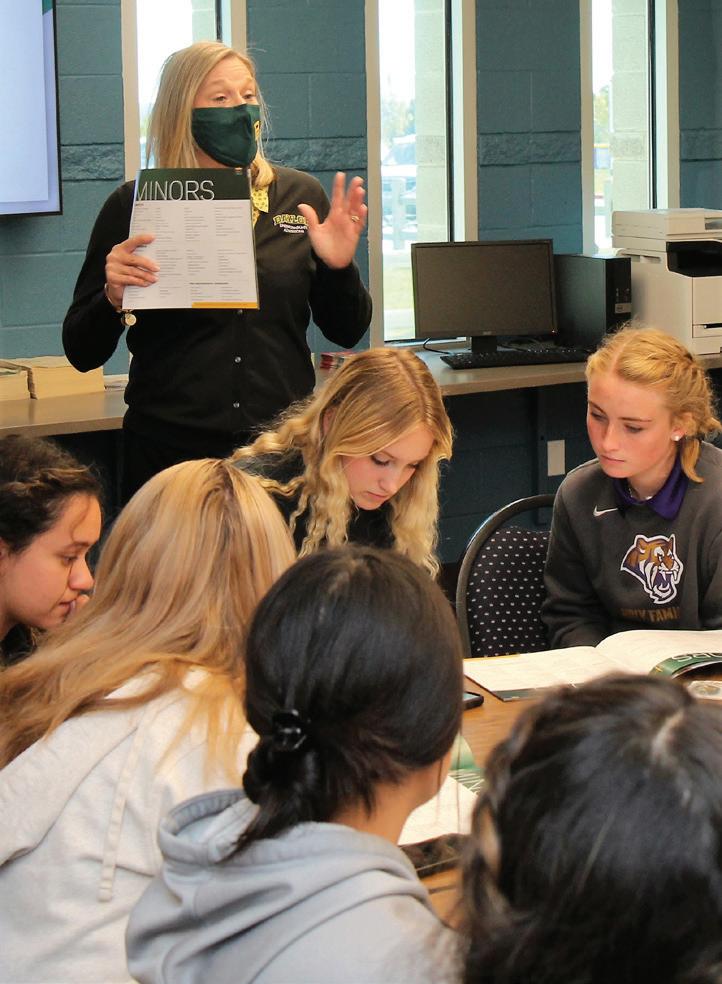
7 minute read
College Counseling
College
Counseling
How do Holy Family students choose the right college? Is there really a college for everyone? How do they start applying to and selecting a college? Holy Family’s College Counselors work to provide support – as co-strategists, sounding boards and mentors. Holy Family’s College Counseling Office is an extension of our education program. Three full-time college counselors – Jacqueline Phillips, Will Wilson and Kelly Fabian - are in constant contact with colleges and universities across the country to remain alert to the issues and trends facing our students, leveraging their expertise and professional relationships to provide strong advice while they support each student in their college search. But before Holy Family students begin thinking about college, they are encouraged to invest in their high school lives. “Ultimately, they will be better college candidates if they have sharpened their talents and discover their passions, academic or otherwise, along the way,” said Mrs. Phillips, the Chairperson of Holy Family’s College Counseling Office. “College is a match to be made, not a prize to be won.” During their freshman year students are first introduced to their dedicated college counselor. In the fall semester of their junior year students begin to work closely with them from researching schools to campus visits and interviews, discerning potential areas of study and finalizing applications. Mrs. Phillips supports students' last names A-G, Mrs. Fabian H-N, Mr. Wilson O-Z. While Holy Family students have access to the collective expertise of the full college counseling staff, the individual college counselor serves as the students’ chief advocate and advisor in the college process. Colleges make admission decisions on a wide range of factors, some of which are beyond a student’s control. College admissions offices see thousands of qualified applicants but can only admit a finite number. What each Holy Family student can do is control the body of work they develop during their time at Holy Family, ultimately using their college applications to tell their personal story. “The best way to build a story that resonates with colleges is by immersing yourself in what interests you both in and out of Holy Family life and pursuing those interests,” said Mrs. Fabian. “Colleges want their students to be successful, socially and academically. Students should consider where they would be happy on a typical Tuesday afternoon.” Students are encouraged to think of the college application journey as another academic class, one that will take time and energy. The first and most important step for a student is to decide what is important to them – academically, socially and culturally – in a school. There are over 4,200 colleges and universities in the United Sates – and, like the students that attend them, they are all different. They are private and public, large and small, located in cities and small towns.
Baylor University's Admissions Rep Jan Kyster presents to Holy Family students.
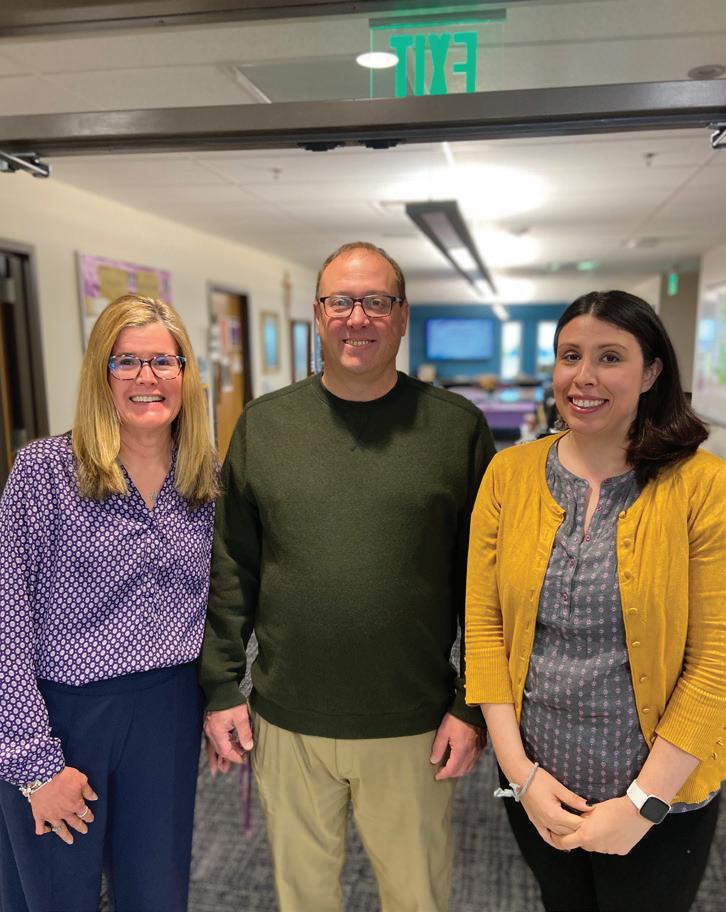
Holy Family's College Counseling team: Jacqueline Phillips, Will Wilson and Kelly Fabian.
There is no ‘one and only’ college for each student. College Counselors encourage students to explore a variety of options, as they will find that each one has its own advantages. “Understanding there is not a perfect college also makes the application process more exciting,” said Mrs. Fabian. “If a student narrows their sights to only one college, they spend too much time worrying about gaining admission
to that particular school – keeping them from seriously considering other colleges and universities.” “One of the most important parts of the college search is the campus visit,” said Mrs. Phillips. “Visiting colleges gives kids a firsthand impression of the students, faculty, staff, facilities, and programs. A website or brochure can only show you so much. To get a feel for the school, a student needs to walk the campus.” Parents can help their student set goals and help identify any parameters with the college search (financial, geographic, etc.). Parents can also help facilitate visits to a variety of campuses. There are no magical formulas for getting into college. The best way for a student to prepare for college is to work to the best of their ability and build a strong academic record in high school. “A student’s admission to a college usually depends most on them being a good student in challenging classes,” said Mrs. Phillips. “The closer they get to doing their best in every class, every day, the more choices they’ll have when it comes time to pick a college– keeping your options open is what being ready for college is all about.” Students are encouraged to explore and develop their interests in and out of the classroom. By developing good study and personal habits, students begin to understand their strengths and weaknesses. “Colleges want to see students challenge themselves with classes,” said Mr. Wilson, who is in his 24th year as a college counselor. “With each passing grade year, classes should reflect increased rigor. Success in tough high school classes can indicate success at the university level.” Many colleges still require standardized test scores. Holy Family students take the PSAT and PreACT during their freshmen and sophomore years. The results of these serve as an indicator of how a student may do on their SAT or ACT and help identify weaknesses that can be addressed through test prep. Students have a range of test prep options. From an abundance of free test prep courses to formal courses offered by outside companies. Students are also encouraged to take advantage of
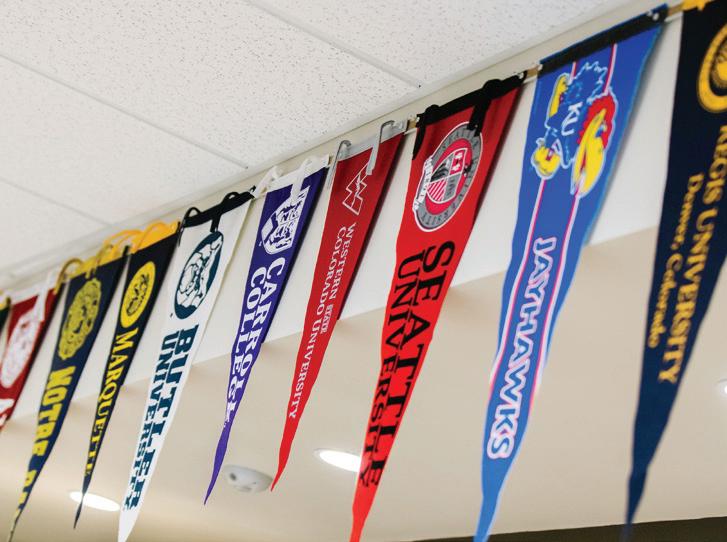
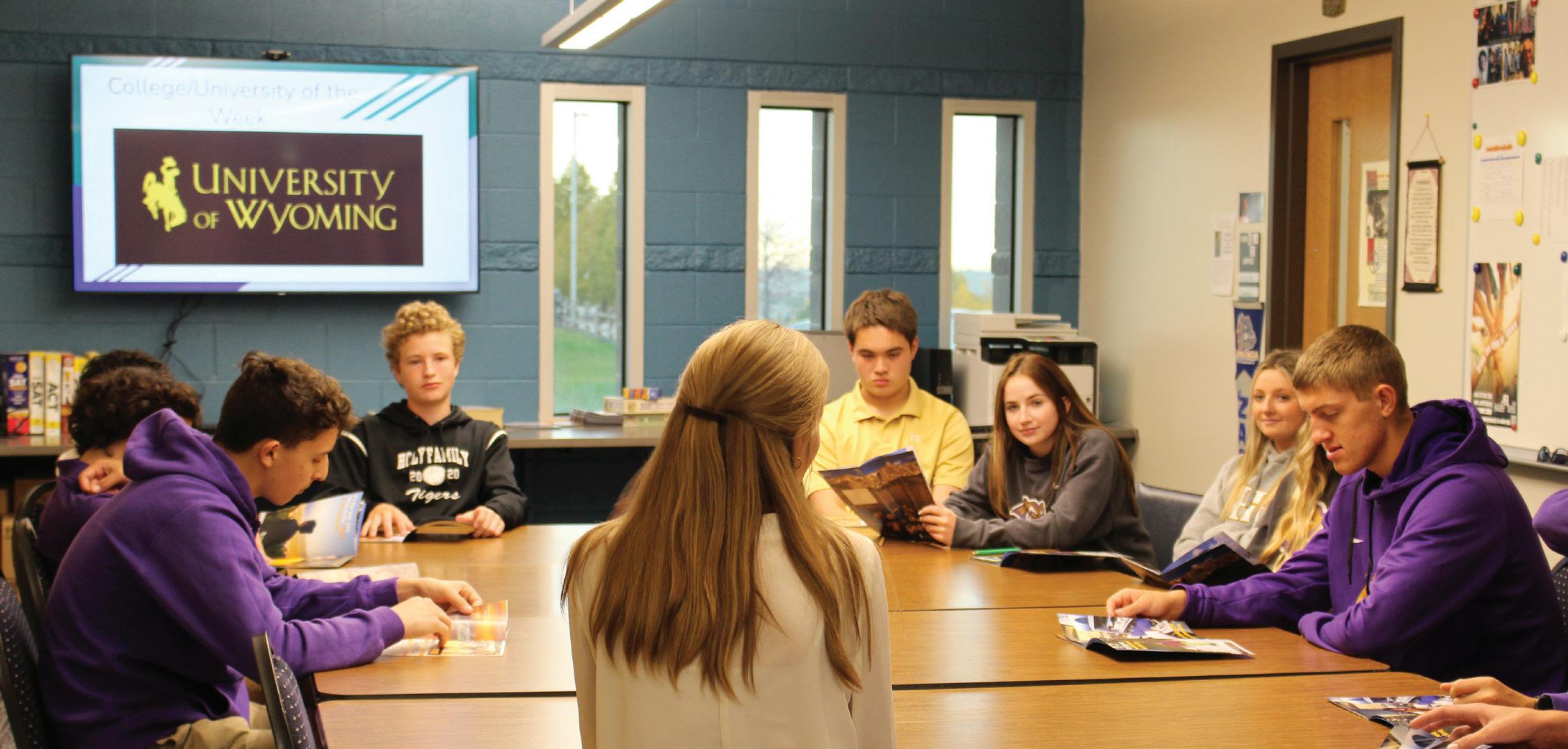
College
Counseling

Class of 2019 graduates representing their college choices. Left to right: Emma Garrett, Kody Clements, Abby Stokes, Sophie Silverstein, Nicolette Sandoval, Ceili Opp
spring and summer breaks to prepare for standardized tests. student and their potential at their institution.
“The pandemic has slightly changed the application,” said Mr. Wilson “Colleges that are making standardized test results as an option are seeing an increase in the number of applications.” In the absence of SAT scores, some universities are focusing on student essays and letters of recommendation and looking for character strengths. Recommendations from teachers and college counselors help college admission officers learn about a prospective student in a way that test scores and grades do not offer. Most colleges have a set of required materials that are used to evaluate a student’s application and make admission decisions. Colleges want to learn as much as they can about each Holy Family students are also encouraged to take advantage of the summer months to get a leg up on the college admissions process. “What students do during their summer break can distinguish them from other applicants of similar academic caliber,” said Mrs. Fabian. “Whether they complete a community service project, get a job or internship, take a course, or go to a camp, summer is a great time to explore interests.” College costs have risen sharply in recent decades at public and private schools alike. However, Holy Family’s College Counselors recommend students shouldn’t cross a college off their list because of its price tag. Financial assistance is available for qualified students at most colleges across the country. Phillips, Wilson and Fabian spend a considerable amount of time advising families about financial aid and merit scholarships. Holy Family’s recent graduating Class of 2021 earned over $14 million in scholarships and awards. This college search takes a lot of planning and decision-making. It is normal for students to feel uncertain, overwhelmed, and perhaps even helpless. But, by using the College Counseling team as an aid, students will find the college admission process to be a time of discovery rather than one filled with uncertainty. “This experience is a rite of passage that pushes you to reflect on your experiences, your character, your strengths and weaknesses, and your goals,” said Mrs. Phillips. “Students will have input from many well-meaning people including parents, relatives, friends, and admissions officers. But the student is the one going to college. They ultimately need to make the decision for them. We are here for support.”
